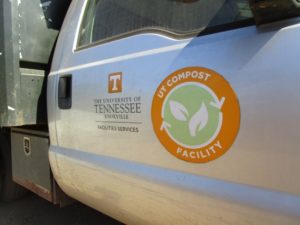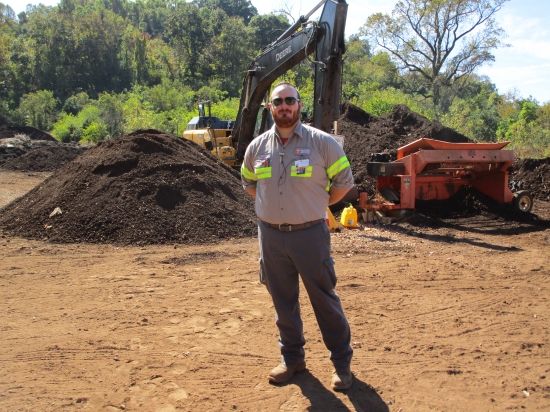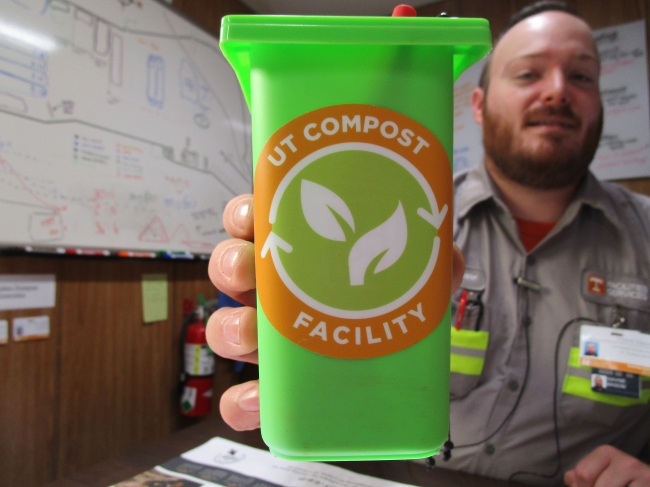
Last fall, Appalachia Bare had the opportunity to conduct an on-site interview with Wayne Mason, the Compost Supervisor at Knoxville’s University of Tennessee (UTK) Compost Facility.1)Over the winter Wayne took a position with a city in the northeast to set up a municipal compost facility. What an eye-opening experience! Wayne took us through the day-to-day operations of the facility, the science and art of composting, the challenges, and the hopeful future of an emerging industry. We hope you enjoy these three short videos from our tour. We learned much during the visit and enjoyed putting it all together for our readers. All quotes are from Wayne Mason.
Composting at UTK
We hope to just, at the very least, be a beacon for the places we can’t serve, right? So, we want to be like, “Here’s how you do it.” This is the example. This, this is how we grew up from scratch ourselves, do that but in a city mindset and a city landscape.
Located in a secluded lot, and surrounded by trees and wildlife, the compost site sits just off the highway; and, except for background traffic noise, could be in just about any mountain holler. On this fine fall day, their cycle of operations was in a transitional phase, meaning most of the finished compost was gone, and collections from the main campus hadn’t really cranked up yet. Here’s a video overview of the facility’s regular operations:
Digging Into the Science
We also need to be more than just a place where compost is processed. We need to be educating folks. We need to be researching into how to make the composting industry better, especially for a state like Tennessee, where the industry just doesn’t exist anywhere.
During our visit, Wayne spoke about the scientific process of composting, which is taking a process Mother Earth does over many years and putting it on fast-forward. He discussed the delicate balance of creating good, usable compost, and what can happen when that balance is ignored. See video below:
Applications and Research
. . . I think composting is one of the great equalizers . . . because it’s like, yeah, we are saving the planet. We are going green, we are doing all those cool things that you may consider like hippie-ish or, you know, artsy-fartsy. And then you go, by doing heavy equipment and messing with agriculture and transforming landscapes and . . . you like the environment and mountains and fishing and all this kind of stuff. But, you know, if you look at one landfill and see how that impacts the landscape, and they’re just massive amounts of trash into a mountain, putting some grass over it. Um, and then you’re like, wow, that, that’s, what they’re doing to your countryside.
The Office of Sustainability has four full-time staff, and the rest are AmeriCorps and students, uh, I have literally nobody I could send out to, to do anything, any kind of damage on a stadium of a hundred thousand people . . . just imagine the amount of waste that comes out of athletics.
The UTK Compost Facility is currently used by “the UT Organic Farms, the Office of Sustainability’s Grow Lab, UT Gardens, and in various flower beds by the UT Landscaping department.”2)from the Compost Facility website They are researching the potential use of compost runoff (aka “compost tea”), currently discarded as sewage. They have a research agreement with a large manufacturing company to test and rate the efficacy of compostable products like garbage bags, utensils, etc., and yes, they do work! More info in the following video:
And the Future
The business side of it, it’s money in the door . . . landfill completely operates off of tipping fees alone, That’s it. But with compost, you don’t just put it into the mountain side and, and, you know, put grass over it when it’s done. In a small, little site, you can process continuously and then sell compost as a back product, as even more profit.
Operated by a small but dedicated Facilities Services staff and an army of passionate AmeriCorps members and student workers, the facility has already had a significant impact on the UTK Campus, and they have a bold vision for the future. As the largest such facility of any university, they are inspiring a new industry that gives back, providing an environmentally positive alternative to harmful chemical fertilizers. They have plans to upgrade the site so they can serve the broader community and continue to educate and advocate for regulations that will allow private enterprises to flourish. Who knew compost could be so cool?
Appalachia Bare would like to give a special thank you to Sustainability Manager Jay Price for making his staff and facilities available.
Photo Gallery
**Video by Tom Anderson
**Featured image and all other images by Delonda Anderson














